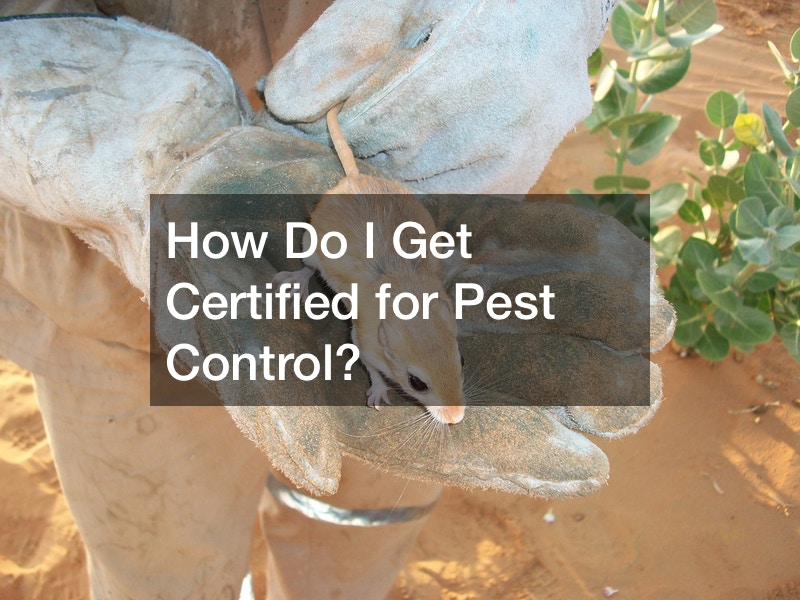
Qualifications to become a certified pest control technician vary according to state and country. To get a better idea of what qualifications are required in your area, contact the department of environmental health, department of agriculture, or an equivalent agency in your area.
Below is a guideline that will help with how do I get certified for pest control.
Learn About Pests

How do I get certified for pest control? A person needs to study all kinds of pests, including what they eat, where they live, how they travel if applicable, netting methods tried and true, preferred bait or poison, and whether your catch needs to be refrigerated.
One of the requirements to become a certified pest control technician is to know about pests. Pests are organisms that cause damage or disease to plants, animals, and structures where they infest. There are different pests such as birds, rodents, insects, and stink bugs.
Stink bugs, for instance, get their name because when they get scared or feel threatened, they will release an unpleasant odor from glands located on their bodies. These insects can be found in homes and buildings during the fall season, where they move inside for warmth and protection against the cold weather outside. As spring comes around, they look for areas outside of our living spaces to lay their eggs and reproduce.
Rodents include rodent family species such as mice, rats, squirrels, and chipmunks. These animals can cause a lot of damage with their nests if left in places where they are not wanted. They will destroy insulation in homes to create living spaces for themselves.
Insects are the largest pest group, and most people come in contact with some insects every day. There are two different types of insects pests, structural pests, and public health. Structural pests affect the building and structures of a home, while public health pests affect the occupants and visitors of the structure. With this in mind, ensure you know to deal with various pests to help you become a certified pest control service provider.
Have the Skills
After learning about pests, the next requirement on how I get certified for pest control services is acquiring the skills needed. A person must learn how to handle them as safely as possible, which also depends on their preferred poison, learn the right equipment needed for rodent removal services or the kind of pest that is being targeted, get training in netting or trapping methods for different kinds of pests, get training on how to use pesticides, chemical repellents, traps, baits, and fumigants correctly.
Pest control is vital for keeping your business and home safe from infestations. Every pest control technician needs to have certain skill sets so they can help you rid your life of those unwelcome pests. To become a certified pest control technician, you must first identify which kind of pest has invaded your property.
You will also need to know where exactly that species lives or spend most of their time on your establishment if you want them gone. If a new species appears on the scene, you will also need to understand how this particular one breeds and grows. This is the only way to defend yourself properly and your property from infestation.
Pests can be dangerous to both humans and buildings, so it is best to keep them out in the first place.
Get Training
When looking at how do I get certified for pest control, training is a crucial element. A person might need to work with residential or commercial pest control companies before starting their own business. This way, they will learn how the pest control company operates. Work experience is usually required by schools offering certification courses. There are also private companies that would train employees already working with pest control services.
Taking advantage of pest control companies is another way to quickly become a pest control technician. The more experience someone has, the better chance they will get hired by one of these large corporations that offer paid training for potential employees. This job could allow someone to get their foot in the door and possibly help them become a certified PCT without paying any dues upfront like most people do when taking education classes on their own time, which typically costs thousands of dollars take years before repayment.
Get the Necessary Licenses

Licensing is another factor of how do I get certified for pest control. Someone needs to get permission or a license from their local government before starting their own pest control company. This is usually called occupational licensure. A person might be required to get a certification to get this license. For example, pesticides are only available to certified technicians, according to the state of Washington’s Department of Agriculture (WA).
Find Clients
If you are wondering how I get certified for pest control, consider looking for clients. Skilled pest control service technicians offering services such as termite treatment do not need to advertise because they will still get more work than they can handle by word-of-mouth recommendations. These professionals will typically have a detailed treatment plan prepared for each job that includes specific chemicals and application methods based on extensive experience with pests.
Keep Safety in Mind
Are you experienced in bed bug removal? How do I get certified for pest control services? A person should be able to work safely with chemicals. They need to know the safety precautions for dealing with different kinds of pesticides, fumigants, and other kinds of poisons, wear the correct PPE personal protection equipment, wash their hands before eating or drinking anything after finishing a job, and even know what clothes are suitable for pest control so as not to contaminate any areas beyond where they are working by tracking poison back home on their boots or clothes.
Stay Current With New Products
Thanks to technological advancements, there are new approaches to controlling pests, including fruit flies. With this, as you look for tips on how do I get certified for pest control, consider learning the new trends in this business. New types of pesticides are developed regularly to help provide effective treatment against pests that may have become resistant to older methods. Therefore, technicians need to keep track of these changes to keep their service as effective and competitive as possible.
Do Good Customer Service
Customers cannot emphasize enough how important it is for technicians to provide quality service when they are already feeling stressed because of pest problems at home or in the office. Therefore, it is important for technicians to be able to find appropriate solutions for any problem that might arise quickly, explain clearly what products they will be using and how these work, show up on time or early, be professional and courteous throughout the process, and answer all questions related to pest control treatments thoroughly so that customers understand why treatment needs to happen. This will significantly impact the process of how do I get certified for pest control.
Complete an Internship as Early as Possible
A key step to how do I get certified for pest control is completing an internship at a reputable company early in life. No matter what one’s age is, it is always better to take steps before taking concrete action. While still in high school, taking an internship would be ideal because one gets first-hand experience on how cockroach extermination companies operate. They will know all the requirements needed to work as a pest exterminator for those companies.
Complete Relevant Education

Knowledge is very important in how do I become a certified pest control technician. With this, it is necessary to complete relevant education. One should attend school and get an environmental science degree or any other relevant course to help them be knowledgeable enough to work as a pest control technician.
Pass the Required Certification Test
Once someone has completed their education and internship, they can start studying for the exam that will certify them as PCTs. The exam itself consists of 100 multiple-choice questions. However, there are only 80 questions on the actual exam. Therefore, one must study hard before taking the test to make sure they pass with flying colors. The certification examination is an important element of how do I get certified for pest control services. Failing the test denies you the chance to be certified to offer pest control services such as mosquito control.
To become certified, you must pass an exam that tests your knowledge of pests and pest control methods. You need to be 18 years old before you take either test. Before taking the CPE, you have a minimum of one year of full-time verifiable pest control experience or a training course in a related subject from a school or other institution that is recognized by federal, state, provincial, or municipal authorities where you live. To take the ERCP, applicants have a minimum of six months experience in pest control, plus either a high school diploma or GED.
The examinations are computer-based and administered at different testing centers nationwide. Applicants must pay a certain fee to take the ERCP and the CPE. You can get more information on testing sites or schedule an appointment by calling the relevant bodies. The tests are not an open book. You will be allowed two attempts within 12 months of completing your application form.
Meet the Age Requirement
Does age play any role in how do I get certified for pest control? You must be at least 18 years old before becoming a pest controller expert, whether you are working on a new house, an old one, or a business property in most cases. In some cities, 16-year-olds can work as an apprentice but only under the supervision of a licensed professional. For example, in Los Angeles, applicants need to be 18 years old and have two years of experience working in the field or one year of experience if they have a four-year college degree.
Submit Proof of Liability Insurance Coverage
Since pest control involves using dangerous chemicals and equipment, your state likely requires that you purchase liability insurance coverage before receiving your license. This helps protect you from lawsuits if someone is injured while under your care. The amount of coverage required varies by state. Ask your city’s health department for more information to understand how do I get certified for pest control.
Renew License Annually
One thing you can not overlook on how do I get certified for pest control is that you must renew your license every year. Some states require this to be done online. Others will send you a renewal notice via mail, which you should return within a certain time. If it is not received and returned on time, your license will become void, and you will have to retake the exam to get it reissued. In addition, some states have reciprocity agreements for pest control technicians from other states who relocate there, so if that applies to you, check with your state’s board or division of licensing.
Know State Laws and Regulations
Your license will state the limits of your authority. To understand how do I get certified for pest control, it is therefore important to stay updated about changes in laws or regulations that could impact you. For example, if someone has a bedbug infestation but does not want to treat it themselves because they lack the funds, then legally speaking, pest control technicians are required to inform the person that they would need to hire an exterminator since their work is limited to termites and other wood-destroying insects.
The pest control industry is an interesting and rewarding occupation. Why? The answer can be found in the word itself, pest. Pest represents such things as rodents, insects, termites, and other animals that damage property and crops of people and other animals. A certified pest control technician assists homeowners, or professional exterminators reduce or eliminating these pests from their premises. Certification is not required to become a pest control technician, but it will communicate competence and experience to employers and clients.



